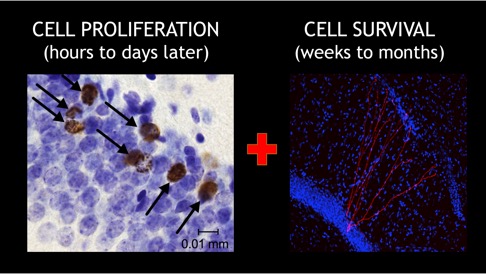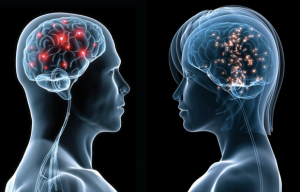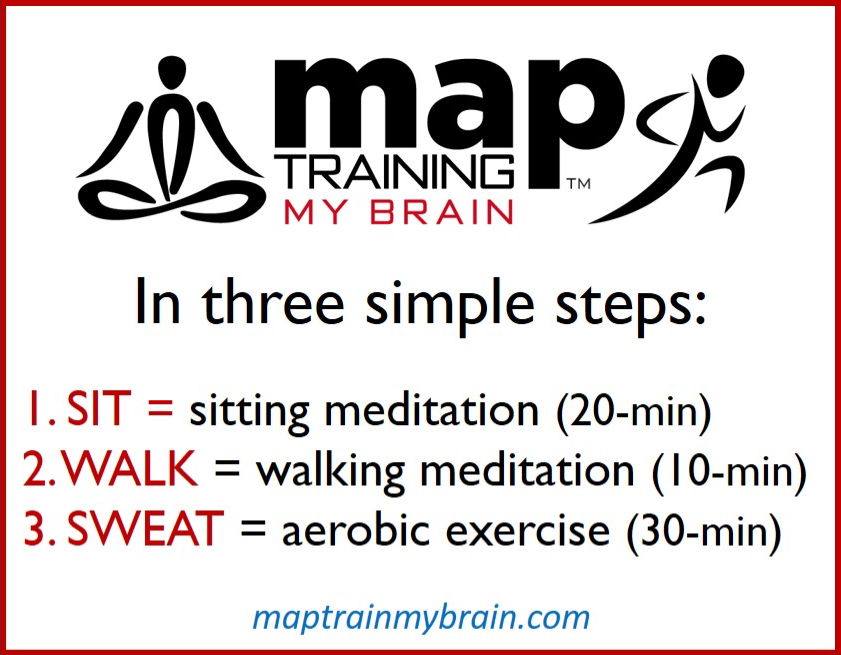Science
NEUROGENESIS AND THE MAKING OF MEMORIES
The brain continues to produce new neurons throughout life, a process known as neurogenesis. Nearly two decades ago now, Dr. Shors and her collaborator Dr. Gould associated these new neurons in the hippocampus with processes of learning and memory. Perhaps more importantly, they found that many new neurons die within weeks but learning can keep the new neurons alive. And the more effort, the more survive. These findings relate to the expression “Use it or lose it.” In addition to learning, aerobic exercise can increase neurogenesis. Thus, both learning and exercise can increase the number of new neurons in the brain. We refer to the combination of these two activities as MAP Training, because it combines “mental and physical” training.

SEX DIFFERENCES IN THE BRAIN
In the distant past (1998!), Dr. Shors and her graduate student discovered significant sex differences in learning and the stress response (Wood and Shors, 1998). They found out that males and females can respond in opposite directions to the same event with males learning better and females learning not as well. These sex differences in behavior are mediated by different brain circuits in males versus females. They also depend on hormones such as estrogen and testosterone. But importantly, these effects change across the lifespan — from puberty and virginity to pregnancy and motherhood. At the time, these sex differences were considered surprising — but not now. We now know that sex differences are all around us.
One in three women in the world experience sexual violence in their lifetime, with lasting consequences (Shors and Millon, 2016). Dr. Shors has developed a model referred to as SCAR, which stands for Sexual Conspecific Aggression Response. With this model her lab reported that exposure to a sexually-experienced male is very stressful for a young female, because she releases stress hormones. There were also lasting effects on learning and neurogenesis in the hippocampus (Shors et al., 2016). These results were found in laboratory rodents and would not necessarily be evident in humans — but they nonetheless underscore the profound effect of sexual aggression on the female brain.
STRESS, TRAUMA AND THE FEMALE BRAIN
Women are much more likely to experience stress-related mental illnesses across their lifetime, including depression, anxiety and post-traumatic stress disorders. They are also much more likely to experience sexual harassment and violence. Thankfully, hope is not lost for females. For example, the experience of motherhood can protect females from some of the detrimental consequences of stressful life experiences. While stress tends to suppress learning in virgin females, it does not do so in females that have just given birth. Perhaps more surprisingly, females that have given birth at some time in their lives learn well, even after a stressful life event, and long after the offspring have left their mother’s side. Once a mother, always a mother.
It’s obvious — men and women are different. We act different, we look different and so of course our brains are different. But we are not only different from males; we are always different from a previous version of ourselves. The female brain changes from childhood throughout puberty to adulthood, from pregnancy to motherhood, menopause and beyond. We are always changing – and we can choose to change our brain.
TRANSLATIONAL NEUROSCIENCE
Professor Shors is committed to helping women overcome the trauma of sexual aggression and violence. Based on her laboratory studies, she developed MAP Training. This intervention, known as MAP Training My Brain™ is a novel brain/heart intervention designed to enhance mental and physical health by exercising the brain and the heart together in one session.
We have provided it to hundreds of people over the past 5 years – and have documented significant increases in both mental and physical health. For example, MAP Training reduces depression by as much as 40% in people with clinical depression. It reduced anxiety nearly in half in young mothers who were previously homeless. And MAP Training increased responses to a measure of self-worth as well as perceived quality of life.
Perhaps most importantly, engaging in MAP Training decreases ruminations about the past – in numerous groups of people, including those with depression, trauma history, PTSD, and even in medical students! These results are encouraging because many of us spend time ruminating about our past, especially negative events and feelings about ourselves and things we have done. This preoccupation with the past often keeps us from living in the present moment. We can all benefit from a bit of MAP Training.




